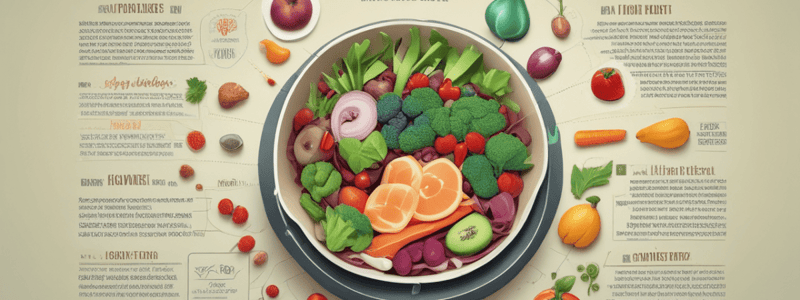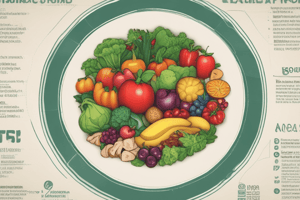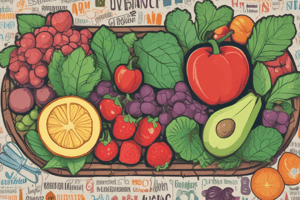Podcast
Questions and Answers
What is a recommended replacement for white bread and rolls?
What is a recommended replacement for white bread and rolls?
- Whole-wheat bread and rolls (correct)
- Cheeseburger, French fries, and a regular soft drink
- Breaded and fried meat, fish, or poultry
- Ready-to-eat cereals with added sugar
What is a healthy alternative to regular soft drinks and other sugar-sweetened beverages?
What is a healthy alternative to regular soft drinks and other sugar-sweetened beverages?
- Breaded and fried meat, fish, or poultry
- Fat-free or low-fat milk, or 100% fruit juice (correct)
- Cheeseburger, French fries, and a regular soft drink
- Ready-to-eat cereals with added sugar
According to the Dietary Guidelines, what is the daily sodium intake limit for a healthy 23-year-old?
According to the Dietary Guidelines, what is the daily sodium intake limit for a healthy 23-year-old?
- Less than 3,000 mg
- Less than 1,500 mg
- Less than 4,000 mg
- Less than 2,300 mg (correct)
What percentage of total calories should come from saturated fat?
What percentage of total calories should come from saturated fat?
What percentage of total calories should come from added sugars?
What percentage of total calories should come from added sugars?
How much of grain intake should be whole grains?
How much of grain intake should be whole grains?
How much alcohol should pregnant women consume?
How much alcohol should pregnant women consume?
What is a recommended replacement for solid fats?
What is a recommended replacement for solid fats?
Which of the following nutrients are 'of public health concern' in the American diet?
Which of the following nutrients are 'of public health concern' in the American diet?
What are two overarching guidelines of the Dietary Guidelines?
What are two overarching guidelines of the Dietary Guidelines?
Flashcards are hidden until you start studying
Study Notes
2020-2025 Dietary Guidelines for Americans
- Published every 5 years by the U.S. Department of Health and Human Services (HHS) and the USDA to promote good health and reduce the risk of major nutrition-related chronic health conditions
- Based on scientific evidence, the guidelines provide recommendations for healthy children and adults
Four Overarching Guidelines
- Follow a healthy dietary pattern at every life stage
- Customize and enjoy nutrient-dense food and beverage choices to reflect personal preferences, cultural traditions, and budgetary considerations
- Focus on meeting food group needs with nutrient-dense foods and beverages, and stay within calorie limits
- Limit foods and beverages higher in added sugars, saturated fat, and sodium, and limit alcoholic beverages
Features of a Healthy Eating Pattern
- Includes a variety of vegetables, fruits, whole grains, fat-free or low-fat dairy products, a variety of protein foods, and oils
- Limits saturated fats, trans fats, added sugars, sodium, and alcohol
- Aim to consume less than 10% of total calories from saturated fat and added sugars
- Limit sodium intake to less than 2300 mg per day
Recommendations for Specific Population Groups
- Infants from birth to 6 months: consume only breast milk or iron-fortified infant formula
- Infants 6 months to 12 months: begin low-sodium, nutrient-dense foods, including potentially allergenic foods, and consume foods rich in iron and zinc
- Infants 12 months to toddlers 23 months: drink cow’s milk or fortified soy beverages, eat a variety of low-sodium foods, and limit added sugars
- Children 2 to 18 years: limit consumption of foods and beverages with added sugars
- Women who can become pregnant, are pregnant, or are breastfeeding: consume 8 to 12 ounces of seafood per week, consume iron-rich foods or take an iron supplement, and limit caffeine intake
- Adults 60 years and older: consume adequate amounts of protein-rich foods
Applying the Dietary Guidelines
- Increase variety of protein foods, including plant sources and seafood
- Consume more nutrient-dense fruits and vegetables
- Choose 100% whole grain and enriched grain products
- Season foods with herbs and spices, and limit salt
- Drink water, fat-free and low-fat milk, and 100% juice instead of drinks with added sugars
- Consume nutrient-dense foods that provide potassium, dietary fiber, calcium, and vitamin D
- Limit cholesterol and trans fats while following a healthy diet
- If consuming alcohol, do so in moderation and only by adults of legal drinking age
Studying That Suits You
Use AI to generate personalized quizzes and flashcards to suit your learning preferences.




